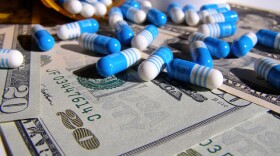Doctors have long disputed that the payments they receive from pharmaceutical companies have any relationship to how they prescribe drugs.
There’s been little evidence to settle the matter — until now.
This story was produced by ProPublica.
A ProPublica analysis has found for the first time that doctors who receive payments from the medical industry do indeed tend to prescribe drugs differently than their colleagues who don’t. And the more money they receive, on average, the more brand-name medications they prescribe.
ProPublica matched records on payments from pharmaceutical and medical device makers in 2014 with corresponding data on doctors’ medication choices in Medicare’s prescription drug program. (You can read their methodology here.)
Doctors who got money from drug and device makers—even just a meal– prescribed a higher percentage of brand-name drugs overall than doctors who didn’t, our analysis showed. Indeed, doctors who received industry payments were two to three times as likely to prescribe brand-name drugs at exceptionally high rates as others in their specialty.
Doctors who received more than $5,000 from companies in 2014 typically had the highest brand-name prescribing percentages. Among internists who received no payments, for example, the average brand-name prescribing rate was about 20 percent, compared to about 30 percent for those who received more than $5,000.
ProPublica’s analysis doesn’t prove industry payments sway doctors to prescribe particular drugs, or even a particular company’s drugs. Rather, it shows that payments are associated with an approach to prescribing that, writ large, benefits drug companies’ bottom line.
“It again confirms the prevailing wisdom … that there is a relationship between payments and brand-name prescribing,” said Dr. Aaron Kesselheim, an associate professor of medicine at Harvard Medical School who provided guidance on early versions of ProPublica’s analysis. “This feeds into the ongoing conversation about the propriety of these sorts of relationships. Hopefully we’re getting past the point where people will say, ‘Oh, there’s no evidence that these relationships change physicians’ prescribing practices.’”
Numerous studies show that generics, which must meet rigid Food and Drug Administration standards, work as well as name brands for most patients. Brand-name drugs typically cost more than generics and are more heavily advertised. Although some medications do not have exact generic versions, there usually is a similar one in the same category. In addition, when it comes to patient satisfaction, there isn’t much difference between brands and generics, according to data collected by the website Iodine, which is building a repository of user reviews on drugs.
There’s wide variation from state to state when it comes to the proportion of prescribers who take industry money, our analysis found. The rate in Nevada, Alabama, Kentucky and South Carolina was twice as high as in Vermont, Minnesota, Wisconsin and Maine.
But overall, payments are widespread. Nationwide, nearly nine in 10 cardiologists who wrote at least 1,000 prescriptions for Medicare patients received payments from a drug or device company in 2014, while seven in 10 internists and family practitioners did.
Dr. Walid Gellad, an associate professor of medicine at the University of Pittsburgh and co-director of its Center for Pharmaceutical Policy and Prescribing, who also reviewed our analysis, said the pervasiveness of payments is noteworthy. “You can debate if these payments are good or bad, or neither, but what isn’t debatable is that they permeate the profession.”
The results make sense, said Dr. Richard Baron, president and chief executive of the American Board of Internal Medicine. Doctors nowadays almost have to go out of their way to avoid taking payments from companies, according to Baron. And those who do probably have greater skepticism about the value of brand-name medications. Conversely, doctors have to work to cultivate deep ties with companies—those worth more than $5,000 a year — and such doctors probably have a greater receptiveness to brand-name drugs, he said.
“You have the people who are going out of their way to avoid this and you’ve got people who are, I’ll say, pretty committed and engaged to creating relationships with pharma,” Baron said. “If you are out there advocating for something, you are more likely to believe in it yourself and not to disbelieve it.”






